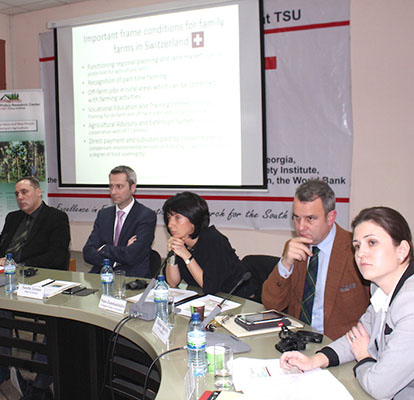On 11 October, 2014 ISET hosted the seventh dialogue in the series of Inclusive Growth Dialogues organized by the ISET Policy Institute (ISET-PI) in partnership with the Swiss Agency for Development and Cooperation (SDC).
The main purpose of this event was to present challenges and opportunities of family farming in Georgia, and discuss related policy recommendations.
The dialogue was moderated by Eric Livny, Director of ISET. The panel included Deputy Minister of Agriculture Gocha Tsopurashvili, Chairwoman of the Georgian Farmer Association Nino Zambakhidze, agribusiness representative Simon Appleby, Deputy CEO of Bank of Georgia Sascha Ternes, head of MOLI Project in Kakheti Carsten Schulz, Kateryna Poberezhna from Environmental Officer of Caucasus Environmental NGO Network (CENN) and the Director of Foundation for Regional Development Rezo Chinchladze. Introductory and framing remarks were done by the head of the Agricultural Policy Research Center at ISET-PI Phatima Mamardashvili.
The ways family farming can potentially support the three dimensions of sustainable development: economic, social and environmental sustainability were discussed throughout the panel. Some of the central questions were how to help family farmers to overcome their challenges and what could be the right policy environment with this regard. To promote a modern family farming sector, Georgia would have to employ targeted agricultural policies focusing on successful commercial and semi-commercial farmers. Broader regional development policies should be employed to facilitate economic diversification and modernization in rural areas.
During the discussion, the current educational system was highlighted as one of the main challenges. The deputy minister emphasized problems related to land use patterns and announced that a new land law will be issued soon. All the participants agreed that there is a necessity for this discussion to continue in the future.
The main goal of the Inclusive Growth Dialogues project, funded by the Swiss Cooperation Office for the South Caucasus, is to provide a neutral platform for a regular discussion of Georgian government policies, donor programs, and civil society-driven initiatives to promote inclusive growth. All interested stakeholders will be engaged in a series of roundtable meetings and lectures complemented by follow up site visits, additional research and analysis. In the end, what we would like to do is share knowledge, learn from the experience of others, and come up with new ideas.











